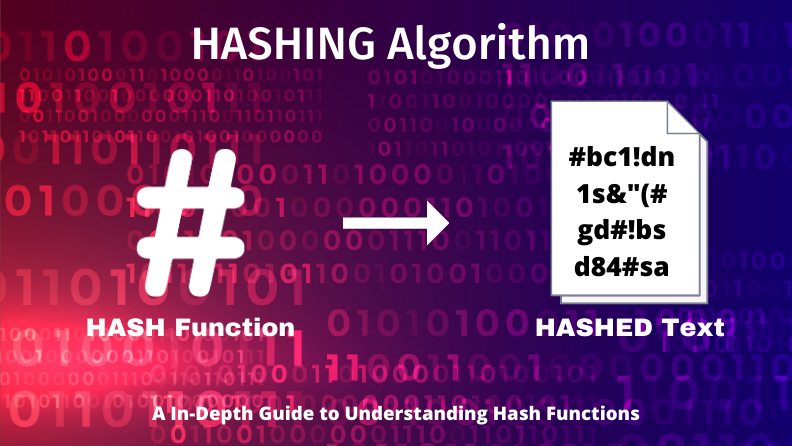In every office, an exchanging of multiple files exists and many people access them for work purpose. While accessing them, the log-in process takes place from different sources existing. For a business, these aspects are common thing and happen regularly. This actually causes unknown and known security threats in an organization. Anyone can use the appropriate username and password to login in to a database. Gathering knowledge about this credential is not a tough job for a hacker. Hence, the system turns out to be immensely vulnerable, hashing algorithms exist to eradicate this issue and provide a proper solution.
Entering hashing algorithm makes the data chopped into small and mixed-up pieces. This makes it difficult to hack the data, whether it is a password or any of the credential. Hence, the end user cannot get the original state of the data, after it is chopped in this manner. The hash function generates the result of a fixed length from specific input information. Hence, this leads the plain text to get converted into encrypted text. However, the hashing algorithm makes this plain text get converted into hashed text. Hence, hackers cannot make any sense of it.
Here is some information about hash algorithms:
Table of Contents
Uniform
A hashing algorithm is always found to be uniform. There are different types of hashing algorithms existing. They work differently, but they do not turn out to be uneven. You can first type in data in a particular algorithm. The data can be of any character of your choice. After it is out into the system, it will come up with results. However, that result can be generated in a different form. But the result will emerge at a length that is already determined by the program.
One Way
Certain systems function in two ways where the activity is interactive. But some systems also exist that process in a one-way manner. As a result, in the latter system, being very cautious is important. Whenever the data is put, it should be checked thoroughly and then only inserted. Similarly, in the case of hash algorithms too, the data is one way. Check the data properly and then only transform it. After the transformation begins, you cannot change the data at all. Reverting the data to its original condition becomes impossible by then.
Document Management
Document management is a very vital process that every organization needs. Hash algorithms contribute to this aspect completely. Hashing algorithms are implemented for authenticating any data. Hence, the security of the data is fully ensured here. After completing the document, the writer uses a hash for securing it. This hash is actually a mark or seal that showcases its approval. Hence, any third party cannot access this document illegally. A recipient needs to be a genuine one to access this document. A recipient can generate a hash and can compare this hash with the original one. The data becomes genuine if both of the hashes are the same.
Digital Signature
Hash also secures data through digital signature. Hence, a hash can be implemented for safeguarding legal or vital documents. Digital signatures are actually small data to be considered. But they are immensely more effective than many other things. Some companies have already started using this aspect. They also use hashes for file identification in a better manner. Hence, the chance of acquiring duplicate data is the least. This digital signature ensures that data was not modified before the time. This means in between the process of delivering of the message and receiving the message, the data remained the same all the time.

MD-5
MD-5 is a popular algorithm and useful too. This was established a long back as one of the first algorithms. All over the world, it had acquired approval adequately. Nearly 30 years back it was designed for securing data. At that point in time, this element was considered as immensely secure indeed. Later, the scenario changed with the upgrading of technology. MD-5 started becoming less likely to secure vital data with time. Hackers have successfully discovered ways to decode this algorithm. Hence, generating the data illegally became possible for hackers. So, currently, it is not stable enough to be used but other algorithms have been invented that enhance the operation aspect.
RIPEMD-160
Creating an algorithm for security purposes is not enough today. Much technological malware and fraudulence take place undoubtedly. This creates a danger of the data getting leaked in different areas. RIPEMD-160 has been developed to eradicate this issue. It was developed during the middle period of the 1990s. Besides RIPEMD-160, there exists other versions like RIPEMD-320, RIPEMD-256, etc. The output length constantly keeps on getting increased. As a result, the security coverage is also increased. Also, this algorithm has till now proved to be secured because hackers failed to understand the ways to crack it.
Hashing ensures password security in an intensified manner indeed. Hashing ensures the passwords are stored in pairs and are hashed for sure. After a person logs in, the password appears to be hashed. If this password is matched with the hashed entry present in the clearly existing data base table, then the user is allowed to continue. Hence, a hash can be used in case of passwords, security, and even file transfers too. People can ensure that the file content that is received is accurate with the help of hashes. In this busy world, it saves a lot of time where otherwise people had to contact each other and check the above aspects.
In the market, many hashing algorithms have already been launched and are highly in demand. These ensure an extra layer of security for the associated data. In the case of the newer versions of algorithms, SHA-2 is a good choice to be made. For any person, it is better to have been updated with the latest versions of hash algorithms. In the case of business though the existing hashing algorithms are much better to be applied. Appsealing allows free trials too for securing one’s data through the use of the algorithms.
















